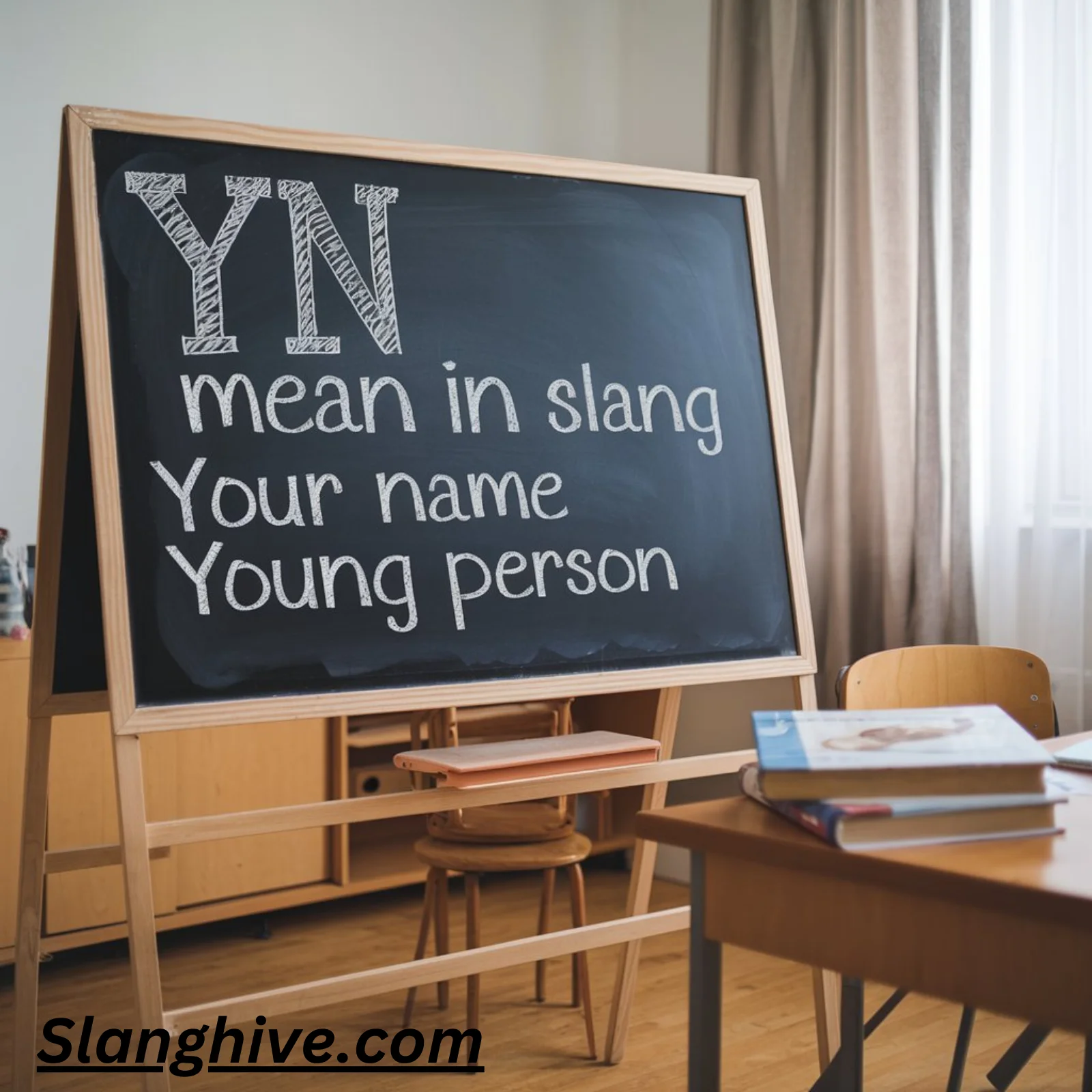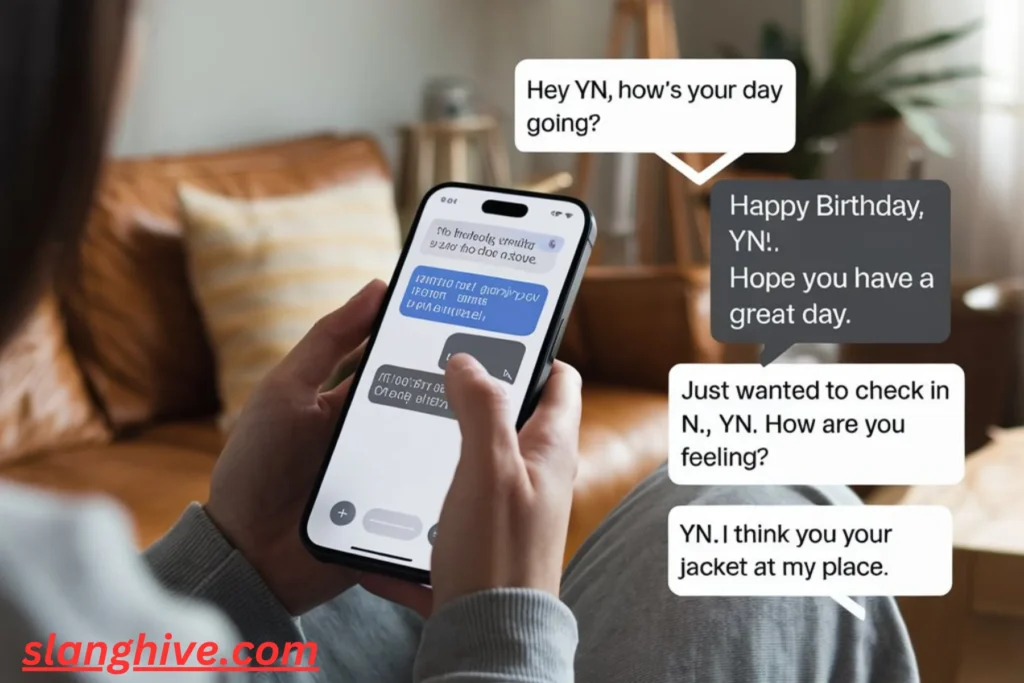
What Does “YN” Mean in Slang? A Complete Guide
In the ever-evolving world of internet slang, “YN” is a term that often pops up in conversations, social media posts, and text messages. But what exactly does it mean? Depending on the context, “YN” can stand for “Your Name,” commonly used in fan fiction and role-playing to let readers insert their own name into a story. It can also have other meanings based on slang usage in different online communities. Understanding slang like “YN” helps keep you in the loop and ensures you’re never left guessing in digital conversations.
Key Points
- Research suggests “yn” in slang commonly means “your name,” used in fanfiction and interactive stories, or refers to a term from AAVE meaning “young person,” which is culturally sensitive.
- It seems likely that the meaning depends on context, with “your name” being more neutral and widely used online, while the AAVE term is specific to certain communities.
- The evidence leans toward “your name” being safer for general use, given the controversy around the AAVE term, which requires careful handling.
“Yn” In Slang Meaning
In slang, “yn” primarily means:
- Your Name: A placeholder in fanfiction or stories, like “yn, I’ve missed you,” letting readers insert their name.
- Young Person: An acronym from AAVE for a term meaning young person, used in some online communities, but it’s culturally sensitive and requires respect.
“Yn” In Literal Meaning
“YN” literally can stand for “yes-no,” often used in surveys or forms, or “your name,” seen in online prompts for personalization.
“Yn” In Cultural Significance
- “Your Name”: Reflects personalization trends in digital content, popular among younger audiences for interactive media.
- “Young Person”: Rooted in AAVE, it highlights the influence on internet slang, but use with cultural sensitivity is crucial.
“Yn” Alternatives and Well Wishes
Alternatives vary by context:
- For “your name,” polite options include “Mr./Ms. [Last Name],” professional is “[First Name],” casual is “Hey [name]!”
- For “young person,” polite is “young man/woman,” casual is “kid.”
- Well wishes: For names, “Happy birthday, [name]!” (polite); for young people, “Keep up the good work, kid!” (casual).
Comprehensive Analysis of “YN” in Slang and Related Contexts
This detailed exploration delves into the multifaceted nature of “yn” in slang, its literal interpretations, cultural implications, and practical applications in communication, particularly among online communities. The analysis aims to provide a thorough understanding for readers, whether they’re navigating internet slang or seeking to communicate effectively in various settings.
Introduction to “YN”
In the dynamic world of internet slang, acronyms like “yn” have become integral to digital communication, especially among younger generations. While it may initially seem ambiguous, “yn” has distinct meanings depending on the context, ranging from a simple abbreviation to a culturally significant term. This article will unpack its meanings, explore alternatives, and discuss how to express well wishes, offering a comprehensive guide for users, parents, and content creators alike.
Literal Meanings of “YN”
Before exploring slang, it’s essential to understand “yn” in its literal, non-slang forms. These include:
- Yes No: Often used in formal or technical contexts such as surveys or voting systems, where participants might be asked to respond with “yn” to indicate their choice, as seen in poll forms.
- Your Name: Used in some online platforms or forms where users are prompted to enter their name, such as registration pages or interactive stories.
These meanings are standard abbreviations in their respective fields, distinct from the creative and informal connotations of slang usage.
Slang Meaning of “YN”
In internet slang, “yn” primarily has two interpretations:

- Your Name: This usage is prevalent in fanfiction and interactive stories, where “yn” serves as a placeholder for the reader’s name. For instance, a sentence like “yn, I’ve missed you!” allows the reader to imagine themselves as the character, common on platforms like Wattpad or Tumblr.
- Young Person: In some online communities, particularly on social media platforms like TikTok, “yn” is an acronym for a term from African American Vernacular English (AAVE) that refers to a young person. Due to its cultural sensitivity, it’s important to use this term with respect and understanding of its origins, and it’s often seen in captions or comments, such as “these yn’s are wild.”
The term “young person” here is a diplomatic way to refer to the AAVE term without using the full phrase, acknowledging its existence without delving into potentially controversial territory.
Cultural Significance of “YN”
“YN” holds cultural importance in online spaces, reflecting values of personalization and cultural expression:
- Your Name: This usage reflects the growing trend of personalization in digital content, allowing users to feel more connected to the stories or messages they engage with. It’s particularly popular among younger audiences who enjoy interactive media, such as fanfiction readers on platforms like Archive of Our Own.
- Young Person: The term has roots in AAVE and is part of the broader cultural expression within those communities. Its use on social media platforms highlights the influence of AAVE on modern internet slang, though it’s crucial to approach such terms with cultural sensitivity and respect, especially given its potential for misinterpretation or offense.
Alternatives to “YN” in Different Contexts
While “yn” is concise, alternatives depend on the audience and tone. Below are examples categorized by politeness, professionalism, and casualness, for both meanings:
| Context | Meaning | Polite | Professional | Casual |
| Your Name | Placeholder for Reader | “Mr./Ms. [Last Name]” | “[First Name]” | “Hey [name]!” |
| Young Person | Refers to Youth | “Young man/woman” | Not typically used | “Kid,” “Buddy” |
These alternatives help tailor communication, ensuring clarity and appropriateness. For instance, in a professional email, using “[First Name]” might be fitting, while “Hey [name]!” works in casual chats.
Expressing Well Wishes in Different Contexts
Given “yn” often relates to addressing someone personally or referring to youth, expressing well wishes can support and encourage others. Examples by tone:
- For addressing someone by their name:
- Polite: “Happy birthday, [name]. Wishing you all the best!” Suitable for formal cards or emails.
- Professional: “Congratulations on your promotion, [name]. Your hard work is commendable.” Ideal for workplace recognition.
- Casual: “Hey [name], good luck with your exam! You’ve got this.” Perfect for text messages among friends.
- For referring to a young person:
- Polite: “I wish you a bright future, young man/woman.” Appropriate for formal settings like graduation speeches.
- Professional: Not typically applicable, as professional settings usually require more formal address, but could be “We value your contributions, young colleague.”
- Casual: “Keep up the good work, kid!” or “You’re doing great, young one!” Common in mentoring or friendly advice.
Practical Texting Examples For User-Friendly Communication

To illustrate how “yn” and its alternatives, along with well wishes, are used in everyday texting, here are some examples.
- “Hey yn, how’s your day going?” (Your name)
- “Happy birthday, yn! Hope you have a great day.” (Your name)
- “Just wanted to check in, yn. How are you feeling?” (Your name)
- “yn, I think you forgot your jacket at my place.” (Your name)
- “Let’s meet up this weekend, yn. I miss hanging out.” (Your name)
- “These yn’s are really making waves on social media.” (Young persons)
- “I saw some yn’s at the concert last night. They were having a blast.” (Young persons)
- “Being an yn these days must be tough with all the pressures.” (Young person)
- “I remember when I was an yn, things were different.” (Young person)
- “Hey, yn, can you pass me the salt?” (Your name)
- “yn, your turn to pick the movie tonight.” (Your name)
- “I’m so proud of you, yn. You’ve come a long way.” (Your name)
- “yn, don’t forget to submit your homework by Friday.” (Your name)
- “Let’s go, yn! You can do it!” (Your name)
- “yn, I need your help with this project. Are you available?” (Your name)
These examples demonstrate how “yn” and related phrases can be integrated into texting, from personal greetings to referring to youth, catering to various tones and contexts.
Conclusion
In summary, “yn” in slang encompasses meanings like “your name” for personalization and a term from AAVE for “young person,” each with cultural significance and appropriate communication strategies. By understanding alternatives and how to express well wishes, users can navigate different settings effectively, enhancing digital interactions. This guide provides a comprehensive resource for understanding “yn” and related communication, ensuring clarity and positivity in every message.


